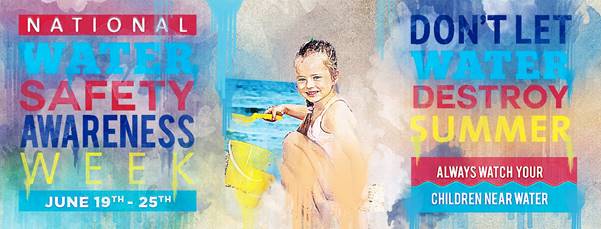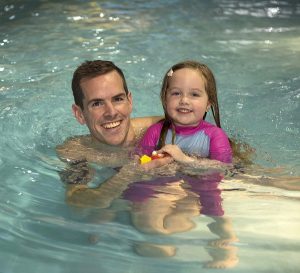372,000 people drown around the world every year, that’s over 40 every hour. And it’s shocking to realise that 37 Children (aged 14 and under) have died in Ireland as a result of drowning over a ten year period (between 2004 – 2014). Water-related tragedies can occur quickly and silently however they can be prevented.
In the lead up to National Water Safety Awareness Week (Monday, 19th – Sunday, 25th June), Water Babies, Ireland’s leading baby and toddler swim school and Irish Life Health, wants to increase awareness of the importance of learning to swim at an early age and advise parents about water safety for little ones, by sharing positive stories of children who have put their water safety skills into action to save themselves. Water Babies has also produced a FREE bookmark, sponsored by Irish Life Health with helpful water safety guidelines for parents. To get a free bookmark visitwww.waterbabies.ie
Mia McLoughlin (4 years old) from Cork saved herself on holidays when she fell into the deep end of a swimming pool. With the skills, she learned at Water Babies she was able to hold her breath and make her way to the edge of the pool safely. Dad Martin McLoughlin said “Swimming is a life skill they need and love to learn, plus it’s good bonding time we can all enjoy.”
Six-year-old Maya Brophy from Galway saved herself when she fell into a swimming pool while on holidays in Tenerife when she was 3 years old. Maya’s mum Suzie was in the pool at the time however was too far away to get to her quickly. Thanks to the skills learnt at her Water Babies classes, Maya swam back up to the surface, found the pool’s edge and held on to it. Maya’s Mum Suzie was relieved “Maya was perfectly fine. Not even scared. It was amazing!”

Maya and her Mum Suzie Allen ~ with WaterBabies “Little Heroes Award winner 2017”
© Michael Chester
+ 353 87 8072295
info@chester.ie
Two-year-old Grainne Carey who swims with Water Babies in Jigginstown in Naas saved herself when she was accidentally knocked into a swimming pool by child who happened to be running past. Her Mum Aoife jumped into save her however she needn’t have worried as Grainne was already hanging onto the side of the pool by the time she got there. Aoife said “Swimming with Gráinne has not been easy she is very headstrong (which means tears and tantrums) and quite often in class she doesn’t follow directions. This means that sometimes I don’t know if she has actually taken in what she has learned. Grainne saving herself has meant the world to me, because even though the classes rarely go to plan for Gráinne and myself, I know that she is taking it all in and gaining knowledge and confidence in the water.”
Both Maya and Grainne started swimming with Water Babies at only 3 months of age. To honour their courage they were awarded Water Babies Little Heroes in February of this year!
Carol McNally from Water Babies said, “We believe that babies should be introduced to the water as early as possible, so they are less likely to experience fear if they do fall in. In most cases it’s the shock of sudden submersion that causes children to panic. Swimming lessons can take place from birth, our youngest swimmer was only one day old, and over the last few years a dozen of our pupils have saved themselves from drowning. We structure our programme to reflect children’s natural development phases and our little swimmers learn through repetitive teaching, word association, play and regular classes.”
National Water Safety Awareness Week is an important national campaign run by Irish Water Safety (IWS) the statutory body established to promote water safety in Ireland. The campaign aims to reduce the number of drowning and near drowning incidents that occur in the Ireland every year. On average, 130 people needlessly die from drowning in Ireland every year and thousands more suffer injury, some life-changing, through near-drowning experiences.
Water Babies works closely with Irish Water Safety to educate parents and change behaviour to prevent drowning and water related accidents and has created a helpful guide for parents, which is available from www.waterbabies.ie
By following these guidelines parents and carers can minimize the chances of a tragic incident befalling their child this summer and all through the year:
Actively supervise young children around water
- Parents must keep an eye on their children at ALL times – they can be easily distracted chatting to other parents, reading a newspaper or talking on the phone.
- Supervising adults should be in arms reach of children under five so that if a child slips underwater, they can be pulled to safety immediately
- The adult watching MUST be able to swim and not afraid to jump in the water.
- If leaving, even momentarily, take your child with you or designate a known adult to supervise – never leave an older sibling in charge around water.
Be safety conscious at the poolside
- Make sure there is a qualified lifeguard in attendance before you or your children enter a public swimming pool.
- Check where the rescue equipment and lifeguards are.
- Do not swim in a swimming pool which has cloudy pool water or where you can’t see the pool bottom
- Save the local emergency numbers on your mobile phone.
Flotation devices are not life preservers
- Toys and inflatables are often unstable and therefore a hazard.
Find beaches that are recognised locally as safe to swim, and preferably lifeguarded. Swim within your depth.
- Find out where the lifeguards are and learn water symbols and flags indicating current beach conditions. Please follow their advice, available at Irish Water Safety’s website, www.iws.ie
Stay sober
- Drinking can impair your supervision and swimming skills – especially when combined with the mid-day heat.
Learn BLS (Basic Life Support)
- Survival depends on a quick rescue and basic life support (resuscitation) if a child has stopped breathing
- Seconds count using Cardiopulmonary resuscitation (CPR) to prevent death or brain damage.
Teach your children these water safety rules:
- Always swim with others, never alone
- Do not push or jump onto others or participate in any dangerous behaviour in a swimming pool – ie horseplay, wrestling, running, jumping and dive bombing – it might result in injury.
- Do not dive into water unless someone has already tested the depth and checked for any underwater hazards. Diving into insufficient water depths can cause face, head and spinal injuries and even death
- Know what to do in an emergency and where to get help. Call 112.
Boating/Fishing
- Make sure everybody wears a lifejacket when boating or fishing that is age and size specific and has a correctly fitting crotch strap.
Water Babies and Irish Water Safety recommend that children learn to swim from as early as possible. Water Babies operate classes in Dublin, Meath, Kildare, Louth, Galway, Sligo, Mayo, Waterford, Wexford, Tipperary, Carlow, Kilkenny, Cork, Kerry and Limerick.
For more info on Water Babies classes, check out www.waterbabies.ie and for adult classes in swimming, water survival and rescue classes, check out www.iws.ie

